
European Tech Hiring Trends
CompTIA’s European Tech Hiring Trends provides an in-depth look at hiring trends across 10 markets.
Working in technology continues to be a lucrative choice for IT professionals all over the world – particularly in the United Kingdom. According to a report from Dealroom and Tech Nation, the UK ranks behind only the United States on the global stage, and investment in the UK’s tech sector has overtaken both India and China compared to the full year 2021 rankings.
We’re talking about £9.25 billion raised by UK-based startups in the first three months of 2022. That’s a massive number and admittedly, hard to wrap your head around. That’s why the UK CompTIA Tech Town Index exists – to break down these numbers and translate them in a way that relates to you, the IT pro.
Of course, it’s grand to know that the industry you work in is growing exponentially. But let’s face it, IT pros on the ground working day in and day out, supporting themselves and their families, need more context around growth, pay, opportunity and affordability. The Tech Town Index not only provides that context but also offers a comparison from year-to-year.
For example, the first UK Tech Town Index debuted in 2019 with Manchester, Bristol and Leeds taking the top three spots, respectively. In the 2020 report, Leeds, Birmingham and Belfast placed in the top three. And this year, Bristol claims the number one rank with Manchester and Cambridge coming in at no. 2 and no. 3. There is consistency among these yearly rankings that gives a nod to solid data. In other words, we’re seeing many of the same regions on the index each year, in a slightly different order. That stability demonstrates credible and accurate research – information you can rely on.
This index is a snapshot created to provide some guidance on locations to consider when looking for a technology job. It is not meant to measure everything. Instead, it gives a unique look into key locations going beyond the number of jobs and considering factors like job postings, projected job growth, cost of living and wages.
There are many factors to consider when evaluating wage. In addition to location, wages may vary based on things like industry or company size as well as individual factors like experience and education. You can read more about the methodology here.
In 2022, Bristol leads the way for growth. The city is expected to add more than 500 net new technology jobs next year. And while growth is the name of the game in Bristol, nobody can surpass London in sheer number of available jobs.
London posted 308,882 open tech jobs in the past 12 months – that’s at least 10 times more than many other cities on the index. With that many job opportunities, it’s no surprise that London also has the highest median tech wage at £49,685.
However, it’s Belfast that wins the affordability category – based on average home prices. In Belfast, the average home goes for £152,603, compared to a UK-wide average of £283,496.
While the index remains largely similar to what we’ve seen in past years, Reading and Bath both fell off the index this year. We also welcomed newcomers, Nottingham at no. 5 and Newcastle at no. 10.
The reality is, with the rise of remote work, we might not be limited to a certain geographic region anymore. But the concept of Tech Towns is more than a guide on where to live. It’s a big picture view of where ideas are born, where talent is made, where innovation is appreciated and ultimately where technology blossoms.
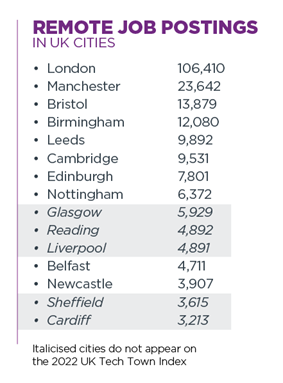
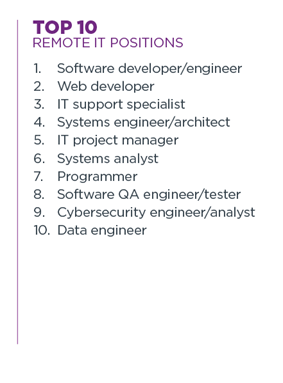
In the past few years, we’ve seen a sharp rise in people working from home. Today, while some have returned to the office, there are still many who now prefer to work completely remote or on a hybrid schedule to get the best of both worlds.
According to the CompTIA IT Industry Outlook 2022, workplace studies over the past 18 months have shown that employees today are demanding different requirements in how they approach post-pandemic normalcy. The fact is that technology enables many people to work from anywhere – and the UK CompTIA Tech Town data supports that.
During the second quarter of 2022 alone, there were more than 121,800 job postings for remote, or at least partially remote, tech positions in the UK This is a notable increase of more than 34% compared to Q2 last year. As it stands, about 1 in 3 of all technology jobs (444,600+ jobs) posted in the UK in the last 12 months are advertised as remote, or at least partially remote.
Which IT jobs are most recruited for remote work? Software developers and engineers top the list – and they seem to be the most in-demand IT positions regardless of location, as there were more than 180,000 job postings for remote software developers and engineers.
*Note: Not all employer job postings specify partial or full remote work, so there is a degree of uncertainty with the data.
Bristol is back on top. In the inaugural issue of the CompTIA UK Tech Town Index in 2019, Bristol held second place status and then dipped to no. 8 in 2020. But in nearly 2 years, the harbourside town has not only reclaimed its rank, but has surpassed it. The city’s tech sector has transcended engineering as the fastest-growing industry, according to data by Tech Nation.
Our data supports that growth. In fact, Bristol ranks first in overall one-year projected growth with 33,895 technology jobs predicted in 2023 – that’s an increase of 522 new jobs. Tech employers in Bristol posted 37,272 jobs between August 2021 and July 2022, and 13,879 of those postings were for at least partially remote positions. Even better news, these jobs are paying quite well. The median tech salary in Bristol is £39,864, which is 46% higher than the median wage across all occupations.
What’s exciting and unique about Bristol’s technology ecosystem is that just 15% of its businesses are classified as ‘established’ as compared to 28% throughout the UK Instead, more than two-thirds of Bristol companies are in the early stages of growth as compared to about half of all UK companies. That’s why Bristol is considered the leading hub for startups in the South West, with local companies making up 20% of the region’s high-growth population.
Employers in the Bristol metro area are constantly looking for software developers and engineers, IT support specialists, systems engineers and architects, IT project managers and web developers. So, it’s no surprise that the most sought-after skills include software development, system design and implementation, technical support, SQL databases and programming, and project management.
This city’s location, burgeoning jobs scene, easy rail links to London and overall desirability, though, have also all contributed to a continued rise in cost of living. The average cost of a home in the Bristol area is £342,432 – up almost £45,000 from 2020. Only Cambridge and London boast higher home prices.
But for some, it might just be a perfect fit.
Chloe Cameron, Chief People Officer at Pax8 EMEA, says, "It’s great to see Bristol named CompTIA's no. 1 UK tech town for 2022 – but this isn’t a surprise to us at Pax8. Since moving here at the beginning of 2021, we’ve been overwhelmed by the level of creative talent in the city and that’s why we’re continuing to hire at pace. A sign of our confidence in Bristol is that later this month, we’re moving into our brand-new offices at The Distillery, which was the biggest commercial investment for Q2 of this year. As we grow, we will continue to create opportunities for the tech sector and champion the city internationally too.”
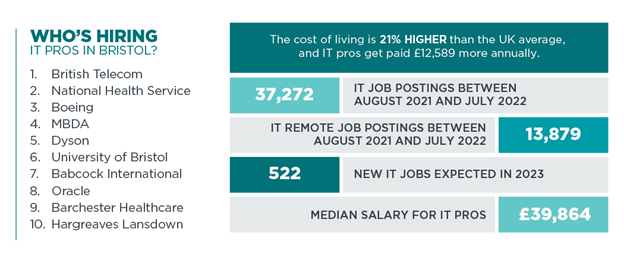 Back to top
Back to top
In 2019, Manchester was the top UK Tech Town. But in 2020, the metro area slid slightly to no. 4, and in 2022, this fast-growing city ranks a solid and impressive second on our index. Also known as the UK’s “top digital tech city,” according to The Data City, Manchester continues to attract tech talent for a variety of reasons including massive career opportunity, access to leading universities and supportive business culture.
In the past year, Manchester posted 63,163 open technology jobs – and the area is expected to add another 442 jobs in 2023. For those who prefer to work at home, 23,642 of the jobs advertised were listed as remote. And while the median tech salary here ranks in the bottom half of our index at £38,685, the figure is still 42% higher than the median wage across all occupations. Top skills requested in Manchester are SQL, software development, JavaScript, tech support, Microsoft developer tools and the all-important professional skills of teamwork and collaboration.
And while Manchester is home to a strong fintech and SaaS industry, jobs are growing across sectors, including cybersecurity, AV/VR and gaming. A new Digital Tech Cluster is set to create 1,000 jobs in the region, and Accenture’s and PWC's expansions will increase jobs in Manchester as well. Other recent developments include a consortium unveiling a new digital security innovation proposition that would bring 1,000 more jobs to the digital and cybersecurity sectors in Greater Manchester, and London-based online trading platform CMC Markets planning to develop a tech hub in the city.
The ability to tap into the area’s highly skilled graduate population has been a key driver for many multinational software and data companies to locate here in the past, while new developments keep them coming. And from the IT pro perspective, your money goes a lot further in Manchester. In fact, affordable cost of living ranks no. 4 on our index with the average home price at £219,700 – meaning young professionals can launch their IT careers here on budget.
According to Gary Bennion, managing director, CloudM, the creative talent fueling the tech industry in Manchester is one of the city’s most appealing factors.
“It’s a clear recipe for success and one that other cities could learn a great deal from – investing in talented youth and creating clear connections and opportunities for those with a passion for the industry.”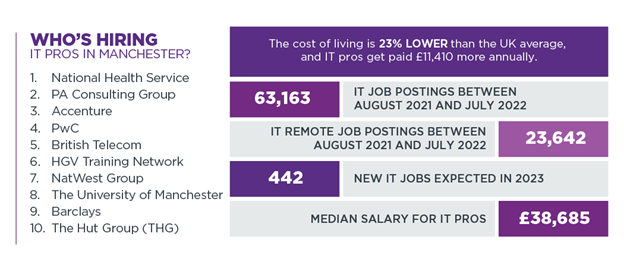
Cambridge continues to climb its way up the Tech Town Index. With a debut ranking of no. 6 back in 2019 and a small jump to no. 5 in 2020, the prestigious university town sits at no. 3 this year. Cambridge has everyone wondering if it’s poised to be the UK’s Silicon Valley.
Pharma giant AstraZeneca is one of the top employers along with the globally renowned University of Cambridge and the National Health Service. Dubbed Silicon Fen, Cambridge scores second on our index in terms of growth and pay. The area posted 28,433 tech jobs in the past year and is predicted to add 323 net new jobs in 2023 – second only to Bristol. And IT pros earn a good salary in Cambridge. The median tech wage is £41,625, which is 53% higher than the overall median wage.
Homegrown talent is a huge competitive advantage in Cambridge, with the University of Cambridge being consistently ranked within the top five universities in the world. More than 4,000 postdoctoral early career researchers from 90 countries work at the University of Cambridge and its partner institutes, supplying a talented pipeline to the technology companies located in the city and beyond.
Not only do tech companies have the luxury of recruiting from the best minds in the world, but many university educators are recognised as being specialists in their field, leading top-tier research for tech players that foster their work. Perhaps that’s why Cambridge is one of the top five cities for venture capital investment in the UK, according to Tech Nation.
Part of the Golden Triangle, including Oxford and London, Cambridge has a reputation as being the home of a flourishing life science tech scene. These employers are seeking IT pros with skills in software development, scripting languages, C and C++, and technical support. And while the area is garnering international attention, experts are concerned that many companies are hitting a bottleneck when trying to grow.
It's possible that the high cost of living in Cambridge could also be a detriment to retaining top talent. Most wouldn’t call Cambridge affordable, with an average home price of £346,456. That’s why Silicon Fen ranks near the bottom of our affordability rankings, with only London being more expensive.
With comparisons to Silicon Valley abounding, Cambridge doesn’t show a desire to be a carbon copy. Instead, the area leans into its own unique culture and continues to put its head down and work. With its deep talent pool, range of investment opportunities, and expertise in biotech and AI, Cambridge is an area to be reckoned with and certainly deserving of its no. 3 rank in 2022.
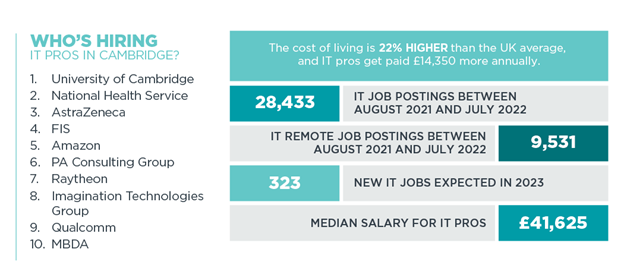 Back to top
Back to top
The largest city in the West Midlands, Birmingham has flipped back to no. 4 on the Tech Town Index after peaking at no. 2 in 2020. Largely known for its role in the industrial revolution, the city is gaining recognition for fintech and emerging technologies as well. In fact, the UK’s new Innovation Strategy addresses the role that regions, like Birmingham, have to play in unlocking the country’s science and innovation potential. That role focusing primarily on greater research and development funding outside of London.
Our research shows that Birmingham puts forth solid numbers in nearly every category the Tech Town Index measures. For example, the city ranks no. 4 in jobs and growth, and no. 5 in cost of living. In the past year, the area advertised for 35,880 technology jobs and has estimated that it will add an additional 354 jobs next year. Add to that an average home price of £222,834, which is 21% lower than the UK average, and you have a strong showing of opportunity and attainability. This consistency across the board is attractive to IT pros.
The top skills that Birmingham-area employers seek are software development, SQL databases and programming, technical support, JavaScript and cloud solutions. And finding qualified IT pros who have these skills may be easier in Birmingham, with a population of more than a million millennials and Gen Z. Birmingham is also home to the highest number of degree level educated women, sitting 19% above the number of degree level educated men.
Perhaps among the biggest contributors to Birmingham’s success in IT is its proximity to a staggering 18 universities. Among them, of course, is Birmingham University, which is one of the country’s top 15 ranked institutions for computer science and offers a diverse array of courses in computing, robotics and artificial intelligence.
And there’s still plenty of room to grow. A government-commissioned review of the fintech sector found Birmingham to be one of 10 UK clusters “below potential, with greater upside to come.” And the experts agree.
“There is no science about when a city begins a virtuous circle with enough good jobs that people get the skills to fill them and because of that new employers keep coming in,” said Diane Coyle, professor of public policy at the University of Cambridge. “Is Birmingham at that level? We just have to wait and see.”
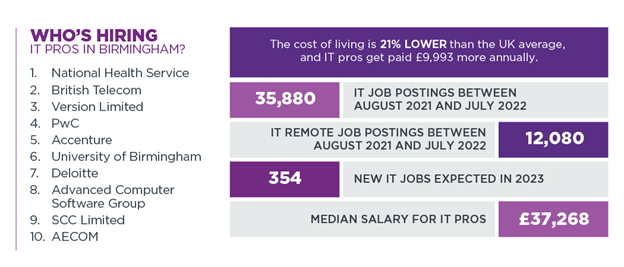 Back to top
Back to top
Nottingham is new to the Tech Town Index this year. This centrally located city has strong fintech roots as the home of Experian, Capital One and Ikano Bank – and a skilled population. Over a third of the people living in Nottingham have university degrees, perhaps that’s thanks to its two world-renowned universities. Additionally, one-third of the workforce is under 30 years old – making Nottingham an attractive destination for IT pros at any stage of their careers.
Two highly ranking factors for Nottingham are cost of living and job growth – a recipe for future success. The area ranks no. 2 in the affordability category with an average home price of £182,415, which is 36% lower than the national average. Belfast is the only other area on the index that can claim to be less expensive. In addition to the affordability factor, Nottingham is projected to have 22,130 tech jobs in 2023 – that’s 312 net new jobs over this year.
Of the 17,667 tech jobs advertised for in the area this year, the most sought-after job titles included software developer / engineer, IT support specialist, web developer, systems engineer / architect and IT project manager. More than 6,300 of those positions were at least partially remote. And while the median tech salary in Nottingham isn’t the highest on the index at £36,505, it’s still 34% higher than the median wage across all occupations. And that salary will go a lot further in an area where the cost of living is 36% lower than the national average.
Nottingham’s tech sector contributes £2.5BN into the local economy and employs approximately 36,500 people. And while the city has a strong fintech foundation, the ecosystem is evolving at an exponential rate to provide the right support mechanisms for businesses of all shapes and sizes. Workspaces, funding streams, talent development initiatives, world-leading research centres – Nottingham has the building blocks for a thriving tech sector.
Located in the heart of the UK, just over an hour from London, Nottingham is the biggest small city in the UK That means you’ll find everything you’d get in a city twice the size, but with a community spirit like nowhere else.
According to Scale Space Nottingham, “Nottingham is a great city in which to build a technology business because of the presence of major corporates, new firms with new ideas, its creative quarter and two universities supplying a strong pool of talent.”
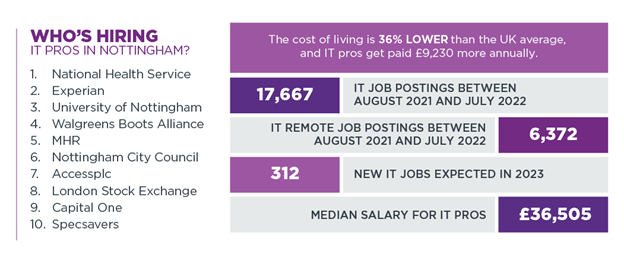 Back to top
Back to top
The booming metropolis of London took a dip on the Tech Town Index in 2020 at no. 7, after debuting at no. 5 in 2019. Probably due, in part, to the pandemic and exodus of people from crowded cities. But in 2022, London is making a bit of a comeback on our index, with a slight jump to no. 6.
It’s no surprise that London ranks first in sheer amount of IT jobs available with 308,882 postings. With an estimated population of 9.5 million, the iconic city has a distinct advantage over smaller metro areas on the index. But those numbers don’t always translate to opportunity. For instance, London ranks no. 9 in terms of yearly growth – with just 485 net new jobs expected in 2023. Compare that to Bristol, which is projected to add 522 new tech jobs next year with a population of just about 700,000 people.
But what London lacks in growth, it makes up for in pay. The median tech wage here is 82% higher than the overall wage across all occupations at £49,685. London is also the highest-paying city on our index. Of course, even that is a double-edged sword as the cost of living ranks dead last. The average home price in London is a staggering £526,183 – 86% higher than the UK average.
Putting the paradoxes aside, London remains an undisputed technology hub in the UK – and the world. The opportunity to grow a lucrative technology career in London is ever-present. The investment in technology continues to grow, helping new and scaling organisations grow and hire more people in tech. Case in point, London has raised more fintech investment so far this year than any other hub globally, including the Bay Area.
These factors, along with the increase in remote opportunities, have helped people from all over the country work in organisations based in London. Specifically, the most advertised jobs this year have been for software developers / engineers, systems engineers / architects, IT project managers, IT support specialists and web developers. And 106,410 of the IT jobs posted in 2022 were considered at least partially remote.
Tech executives are eyeing London as well. The city remains a key destination for international firms looking to spread their wings, with both U.S. and European companies revealing inaugural or upsized offices in the UK capital. The bottom line? The London tech scene remains a staple on the Tech Town Index.
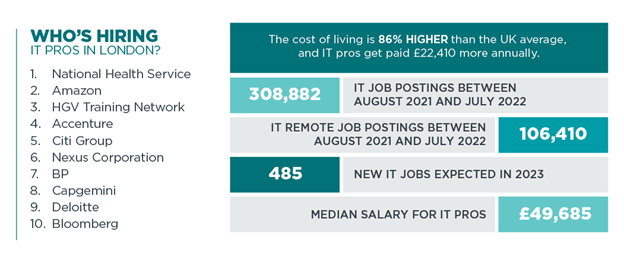 Back to top
Back to top
The capital of Scotland holds steady on the Tech Town Index at no. 7 this year. Edinburgh’s tech hub status is on the rise as more and more companies specialising in AI put down roots here. Thanks to the AI expertise stemming from the University of Edinburgh, the healthcare and financial sectors are particularly robust, with the fintech and biotech industries not too far behind.
Perhaps it’s the heavy focus on AI research in Edinburgh that pays so well. The area ranks third on the index in terms of salary, with a median tech wage of £40,107 – 47% higher than the overall median wage. Local employers posted 24,459 open tech positions in the past year, and Edinburgh is estimated to add 256 new jobs in 2023. Some of those jobs may be for software developers / engineers, IT support specialists, systems engineers / architects, IT project managers and web developers – as these are the most advertised job roles.
In fact, public safety technology giant Motorola Solutions just opened an Edinburgh office to unite voice, video, software and AI to help public safety agencies and enterprises better detect and analyse events, communicate and respond appropriately in any situation.
A key factor in Edinburgh’s growing success is the increasing number of second-generation entrepreneurs staying local. These people have experience in previous startups and are leveraging their experience to do it again – something the city didn’t have a decade ago. But there are some obstacles Edinburgh needs to overcome in order to reach full-fledged tech hub status. Experts say there is a shortage of office and lab space for mid-sized companies that have outgrown shared locations but can’t build their own just yet. And according to Knight Frank’s UK Cities 2021 report, Edinburgh ranked 10th for its digital and physical connectivity – something tech companies rely on.
But when it comes to affordability, Edinburgh redeems itself just a bit. The city ranks no. 7 in our cost of living category with an average home price of £321,679. While it’s not cheap, it’s certainly not the most expensive either at just 13% higher than the average UK home price.
"I truly believe the more success Scottish startups have, the more the world will start to consider Edinburgh alongside established tech hubs like LA and New York," said Nigel Eccles, the founder of FanDeul, an online sports betting company started in Edinburgh in 2009.
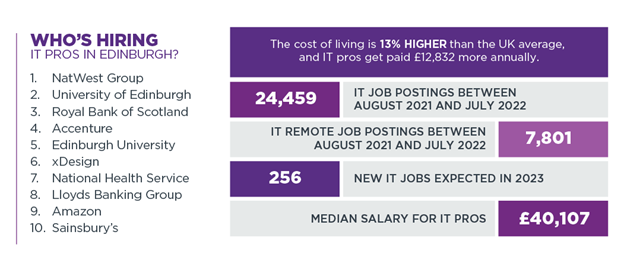 Back to top
Back to top
In 2020, this West Yorkshire city paved the way for the Tech Town Index claiming the crown at the no. 1 spot. But as we all know, a lot can happen in just two years. In 2022, Leeds has fallen to no. 8 on our index. Why the slide?
Well, it looks to be a combination of factors including job growth and cost of living. When Leeds sat at no. 1 on the index, the cost of living was pretty low with the average house in the area priced at £197,026. Today, that number is £229,139. While it’s still 19% lower than the national average, the cost of living has undoubtedly increased.
Additionally, from 2020 to 2021, there was a 2.1% projected job growth. And while the city posted 29,850 jobs this year, which more than doubles the figure two years ago, significant growth into 2023 is not expected. In fact, the area is projected to add just 138 new tech jobs next year in a city with a population of approximately 525,000. Furthermore, in 2020, Leeds boasted a respectable median wage of £41,360. Today, that figure is slightly lower at £39,365.
But it’s not all bad news for Leeds. One of the best things the city has going for it is its nine universities that produce 39,000 graduates each year. Of those graduates, 18,000 come from STEAM (Science, Technology, Engineering, Arts and Maths) subjects. And most of the graduates choose to stay in Leeds. In fact, 56% of them stick around and 70% of those who leave to pursue another degree somewhere else eventually come back.
Leeds has gained a reputation for developing the skilled staff and financial muscle needed to fund startups and innovation, especially in healthcare, but also in more traditional areas like finance, legal services, manufacturing and retail. Amongst those fields, the most in-demand job roles include software developers / engineers, IT support specialists, systems engineers / architects, web developers and IT project managers.
Leeds is a deep well of data science graduates as well, and one of the reasons why Bank of England governor, Andrew Bailey, says they chose Leeds as its new base.
“We wanted somewhere that has a presence in terms of financial services staff,” he said. “With universities we could recruit from, and that we have partnerships with. Data science is one of our growth areas.”
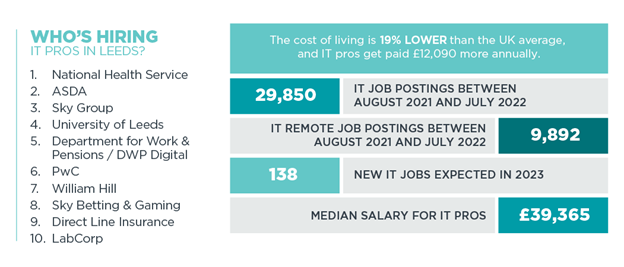 Back to top
Back to top
We welcomed Belfast to the Tech Town Index in 2020 at no. 3 and the city remains a promising tech hub, even with its slide to no. 9 this year. Northern Ireland’s capital city in the centre of the region’s tech scene boasts more than 25% of all available jobs in the city being tech-related. That number compares to just 10% in 2018, indicating significant growth.
The area takes first place in the cost of living category with the median home price sitting at £152,603 – a whopping 46% lower than average in the UK And Belfast sits right at the middle of our index in terms of growth percentage equating to an estimated 204 new tech jobs expected to be added in 2023. The capital city posted more than 15,000 open tech jobs this year with approximately 4,700 of them advertised as remote opportunities. And while the median tech wage of £34,599 ranks no. 10 on the index, that figure is still 27% higher than the overall median wage and goes particularly far in a city where the cost of living is well below average.
Multinational tech companies like Fujitsu, SAP and Microsoft all have presences in Belfast, and business clusters include cybersecurity, AI, data analytics, fintech, govtech and sports tech. Those companies – and many others – are hiring for senior software developers / engineers, IT support specialists, web developers, IT project managers and systems engineers / architects, among many others.
Top employer PwC offers new grads an opportunity as a graduate tech consultant. This two-year programme is underpinned by a development framework that broadens and deepens knowledge and allows entry-level IT pros to learn from hands-on coaching and support from experienced colleagues.
And PwC isn’t the only company looking to develop a pipeline of tech talent. Online fashion and cosmetic retailer Asos recently announced its first Assured Skills Academy cohort at its new Tech Hub in Belfast. The company has invested £14 million in the facility and says it will create 184 new jobs over the next three years.
“As we continue to scale our investment in technology, we are looking for hire talent across engineering roles into our new tech hub and help foster talent in Northern Ireland by supporting its growing reputation as a centre for tech excellence,” said Cliff Cohen, chief technology officer at Asos.
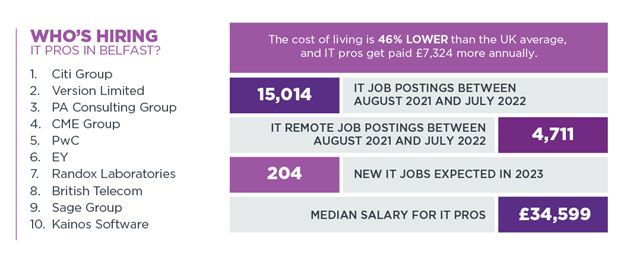 Back to top
Back to top
Newcastle is a rising tech hub and makes its first appearance on the Tech Town Index this year. The city is set up for long-term growth according to Invest Newcastle. The investment service boasts that Newcastle is internationally connected, surrounded by talent and is one of the UK’s most cost-effective cities to do business in.
And our data supports that. In fact, Newcastle places no. 3 in cost of living with a median home price of £184,656 – 35% lower than average. But the area still has some work to do. Newcastle ranks no. 10 in both number of tech jobs posted (11,267) and one-year growth (expected to remain virtually unchanged). And the pay ranks near the bottom of our rankings as well with a median tech wage of £36,019 – which is still 32% higher than overall wages across sectors.
But Newcastle is attracting more and more businesses every year. Companies are benefitting from the city’s more than 6,500 hectares of developable land, property prices that are 31% less than other UK cities, more than 300,000 square feet of available office space and £1.5 billion of planned investment. In fact, this summer, U.S.-based company Credera announced its plans to establish a presence in the region that will bring 200 new high-tech jobs with it.
Newcastle has the highest proportion of STEM and computing students in the country and its strengths lie across gaming, e-commerce, software development, data analytics and immersive technologies. The city’s £1.7 billion regional life science ecosystem employs around 8,000 professionals in nearly 200 companies pioneering pre-clinical research, diagnostics, rare diseases and ageing. And Newcastle’s heritage of shipbuilding, oil and gas serves them well for transferable skills to renewable offshore markets. With these emerging markets, it’s no surprise that technology roles like software developers / engineers, IT support specialists, systems engineers / architects, web developers and IT project managers are the most in-demand positions for top employers like the National Health Service, Sage Group and the Department for Work & Pensions.
While Newcastle just made the cut this year, there’s big things in store for this North East town. Credera CEO in the UK, Chris Dean, said it best: “We believe that the city’s growing tech scene will open the door to new and exciting opportunities for our people and clients alike, and we look forward to welcoming new and diverse perspectives to our community.”
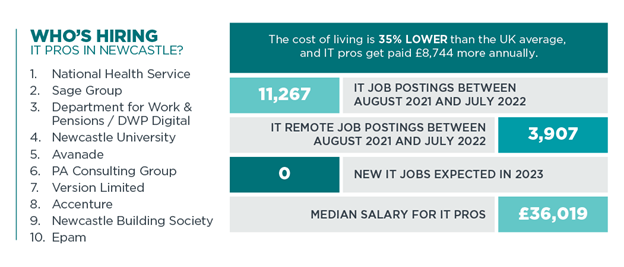 Back to top
Back to top
| Travel to Work Area | 2022 Tech Town Rank | No. IT Jobs Ad Rank | Cost of Living Rank | Tech Pay Rank | 1-Year % Job Growth Rank | 2020 Tech Town Rank | 2019 Tech Town Rank |
|---|---|---|---|---|---|---|---|
| Bristol | 1 | 3 | 8 | 4 | 1 | 8 | 2 |
| Manchester | 2 | 2 | 4 | 6 | 7 | 4 | 1 |
| Cambridge | 3 | 6 | 9 | 2 | 2 | 5 | 6 |
| Birmingham | 4 | 4 | 5 | 7 | 4 | 2 | 4 |
| Nottingham | 5 | 8 | 2 | 8 | 3 | NR | NR |
| London | 6 | 1 | 10 | 1 | 9 | 7 | 5 |
| Edinburgh | 7 | 7 | 7 | 3 | 6 | 6 | 7 |
| Leeds | 8 | 5 | 6 | 5 | 8 | 1 | 3 |
| Belfast | 9 | 9 | 1 | 10 | 5 | 3 | NR |
| Newcastle | 10 | 10 | 3 | 9 | 10 | NR | NR |
CompTIA’s UK Tech Towns Index is a snapshot created to provide some guidance on locations to consider a tech job. It is not meant to measure everything. It gives a unique look into ‘key locations’ as it goes beyond number of jobs and considers factors such as job postings, projected job growth, wages and cost of living.
The initial top 10 metropolitan areas (or travel to work areas) are selected based on location quotient (LQ) using Lightcast data (i.e., number of tech job postings as a portion of all job postings per metro area compared to the UK over the last 12 months.).
A location quotient is a measure of concentration, comparing local concentrations to the national level. All 10 of these metro areas have a higher demand than average as far as number of tech job postings by all job postings in comparison to the UK as a whole.
Note: There was a change in the formula Lightcast uses to calculate LQ (which formerly used employment figures). Hence, some changes may also be a result of this update.
Additional factors are then considered to develop CompTIA’s ranking among these 10 metro areas, including actual number of tech job ads, projected tech job growth, median annual tech wages (new variable added, and cost of living (CoL).
CompTIA’s Index is based on variables for each of four main factors: hiring demand over last 12 months (tech job postings), projected tech job growth, median annual tech wages and cost of living.
Variables Data Sources
Note: Location quotient is the primary factor in determining the initial list of 10 metro areas to assess (i.e., the number of tech job postings by all job ads per locale compared to the entire UK).
After the pool of 10 metro areas are determined using location quotient data from Lightcast, CompTIA ranks each of the four variables above from 1st to 10th for each metro area. The mean average is then figured amongst all four variables per metro area. The resulting mean average, or score, per metro area then determines the overall ranking for CompTIA’s final list.
CompTIA’s Index is based on data available as of August 2022. The availability of data was a factor in the output.
On the occasion when the mean average ties, the metro area with the lower cost of living is ranked higher.
CompTIA’s Index is based on core information technology (IT) occupations. This covers positions such as the following:
Job posting data is a useful, but imperfect proxy for job demand. Not every posting translates to a new job. Hiring firms may change their plans, post multiple times for the same job, hire internally, try different approaches to find the right candidate and so forth. Also, one job ad may be posted multiple openings. Lightcast addresses many of these issues, but not all. CompTIA recommends using job posting data in conjunction with employment data to get a more complete picture of labour dynamics for a given occupation category.
CompTIA subscribes to numerous data sources including Lightcast (formerly Burning Glass and EMSI). In addition, CompTIA incorporates UK government data such as from the Office for National Statistics (ONS).
The cost of living for the UK is primarily determined by the average price of housing as provided by the ONS Housing Price Index. Consider that UK might not have as many cost of living differences as a larger region such as the U.S. may have, hence CompTIA’s use of house pricing as a leading indicator for differences across the region.
CompTIA rolls up data available at the county/unitary authority level to respective metro areas as needed. Still, there are more than 200+ metro areas in the UK
There are many factors to consider when evaluating wages. In addition to location, wages vary based on occupation, industry, company size, etc. as well as individual factors such as experience, education and specialty skills.
CompTIA State of the Tech Workforce UK
Student Perspectives of Technology and Careers
What Kind of Jobs Can You Get with CompTIA Certifications?
Find a Job with CompTIA and ZipRecruiter
UK CompTIA 2020 Tech Town Index
UK CompTIA 2019 Tech Town Index
U.S. CompTIA 2021 Tech Town Index
Read more about IT Workforce & Diversity.
Tags : IT Workforce & Diversity